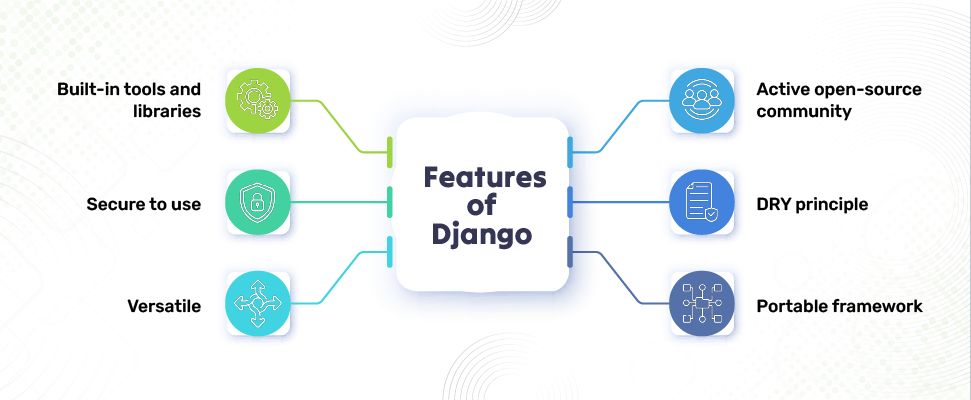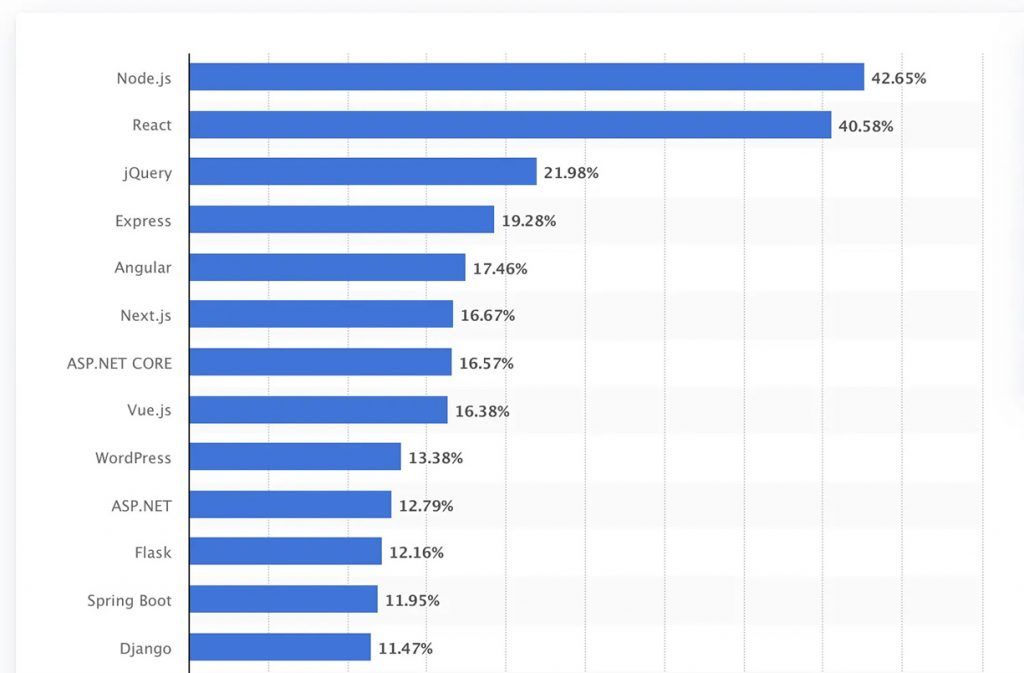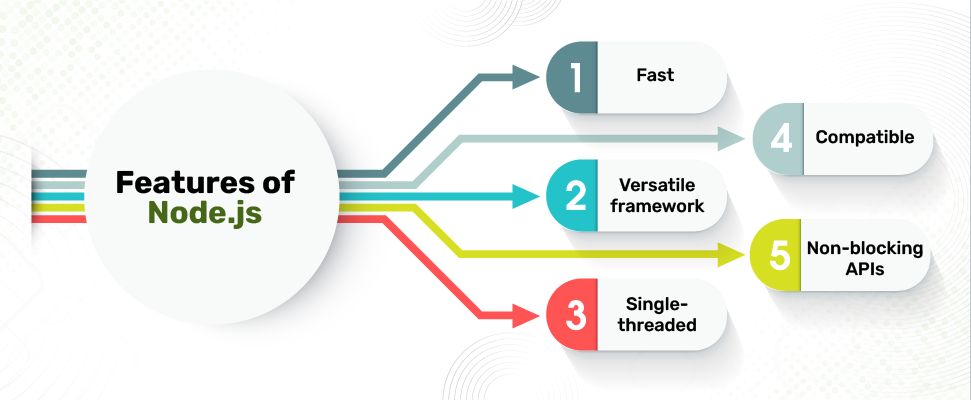Table of Contents
ToggleIntroduction
Backend development forms the core of web applications. Web servers, programming languages and frameworks, and version controls ensure that websites give optimum performance. As a developer, you need to know everything about Django vs Node.js to help millions of businesses build robust and scalable websites. In this blog, we will understand the similarities and differences between Django, a Python framework, and Node.js, a JavaScript runtime environment.

Don't miss out on your chance to work with the best
Apply for top global job opportunities today!
Django vs Node.js: Overview
What is Django?
Django is a Python web application framework that helps developers build applications from scratch. Django is available open source under the BSD license and the latest official version, Django 5.0.6 needs Python 3 version. As a high-level Python web framework, it follows the MVT architecture and has a clear and readable syntax. Django has an estimated market share of 32.06% in the web framework market.
Features of Django

- Django has built-in tools and libraries that help Python Developers create web applications quickly.
- Django’s user authentication system promotes secure management of user accounts and passwords.
- Django can be used to create a variety of applications in any form (HTML, RSS feeds, JSON, and XML).
- Django’s active open-source community provides regular contributions that help beginners and programmers find solutions easily.
- Django’s independent architecture allows for hassle-free change or replacement of components.
- Django makes use of the DRY (Don’t Repeat Yourself) principle, which makes it easy to maintain the applications.
- Django is a portable framework, meaning developers are free to run it on multiple platforms including Django hosting sites.
What is Node.js?
Node.js is a cross-platform JavaScript runtime environment that lets developers create servers, web apps, command line tools, and scripts. It is open source and the latest version, Node.js 22.1.0 is available to install on the website’s prebuilt installer. As an event-driven framework that does not prescribe a specific architecture, Node.js offers developers the flexibility to choose their own patterns. Node.js is the top framework used by developers worldwide as of 2023.

Source: Statista
Features of Node.js

- Applications built using Node.js are fast as Node.js runs under the V8 JavaScript Engine in Google Chrome, which helps with rapid code execution.
- Node.js is a versatile framework as it can be used to build the backend and frontend of applications.
- The single-threaded event-looping paradigm of Node.js lets its server respond in a non-blocking, scalable manner.
- Programmers can choose any programming language and work on different platforms when using Node.js as it is highly compatible.
- Node.js has non-blocking APIs which means once it calls an API, it proceeds to the following API without waiting for an API’s return.
Also Read : WHAT IS NODE.JS USED FOR?
Django vs Node.js: Key Differences
Architecture
Django follows MVT (Model View Template) architecture and is best suited for monolith architecture-based projects. For example, you can use Django to build applications where all the services and components are combined in a single giant codebase.
Node.js architecture is event-driven and is best suited for microservices. For example, you can use Node.js to build events like a button click, scroll, hover, swipe, etc.
Result: Both Django and Node.js have architecture that is good in their own way based on which project you are working on.
Performance and Scalability
Django helps developers build complex, data-driven websites efficiently. Its robust data handling is ideal for applications that need heavy content management and database interactions. Also, Django applications can efficiently manage high-user traffic and offer high-level security for sensitive user data.
Node.js is known for its ability to manage data in real time and handle multiple ongoing user interactions efficiently. Further, real-time data expands with time, and Node.js applications can easily maintain responsiveness and performance.
Result: Both Django and Node.js offer high-quality performance and scalability.
Security
Django has a standard library with inbuilt robust security features. Additionally, Django receives frequent updates that keep the framework secure. This helps developers prevent common vulnerabilities like SQL injection and cross-site scripting (XSS).
Node.js also has features that help build secure applications. However, the asynchronous nature of its architecture can lead to a few challenges while handling certain security tasks. For example, beginners might find it difficult to manage tricky security tasks if certain documentation is outdated or erroneous.
Result: Django’s built-in security features make it a better choice than Node.js. However, it depends on which technology your project needs.
Cost Efficiency
If you are creating applications in Django, it would take less time, as it allows you to manage multiple tasks simultaneously. This makes Django a cost-efficient choice.
Building applications in Node.js can end up being a time-consuming process as the functions consume more time. This makes it a less cost-effective choice.
Result: Working on a web development project using Django is more cost-effective than Node.js.
Community Support
Node.js has a large, active community that offers several resources, libraries, and solutions. Node.js developers who are active in the community frequently update the Node.js documentation with reviews, updates, and feedback.
Django is also known for its active community. Compared to JavaScript-based technologies, Django has a smaller community. However, the Django community has many academic programmers who contribute to the community base.
Result: Both Node.js and Django have an active, dependable community.
Total Cost of Ownership (TCO)
Node.js is free and open source which reduces licensing costs.
Django is also open source, but you may have to add additional components externally.
Result: Evaluating TCO depends on the budget of your project.
Developer Experience and Learning Curve
Django has a straightforward approach, making it a beginner-friendly framework. It has a structured approach, supportive community, and enough documentation for beginners to get started with Django easily.
Node.js is a JavaScript tool, which means that someone with a good understanding of JS can easily use Node.js. Developers used to asynchronous programming and JavaScript and Node.js’ vast library of NPM packages can easily find their way through the runtime environment.
Result: Django is a great choice for beginners as it is a feature-rich framework but Node.js is ideal for JavaScript savvy developers.
Ecosystem and Integration Capabilities
Django has a feature-rich platform that eliminates the need to depend on external plugins. Being a part of the Python ecosystem, Django has access to many libraries, especially for machine learning and data analysis projects. In addition, Django also supports integration for popular databases.
Node.js comes with a simple architecture and several modules and packages that help developers use it to work on projects in real time. Node.js also allows cross-platform development for multiple platforms.
Result: Both offer robust ecosystems and capabilities to build robust backend applications.
Suitability and Use Cases
Django is a great choice if your back-end development project is data intensive. For example, CMS, eCommerce websites, data analysis tools, and educational databases would benefit from using Django.
Node.js, on the other hand, is a good option for projects where you need real-time data processing. For example, Node.js can offer real-time features to build video streaming platforms and chat applications.
Result: Django is a good choice to build content-heavy projects dependent on data. Node.js works best for real-time projects.
Must Read: NODEJS FRAMEWORKS FOR APP DEVELOPMENT Django vs Node.js: Comparison Table
| Aspect | Django | Node.js |
|---|---|---|
| Type of Technology | It is a high-level Python framework. | It is a JavaScript runtime environment. |
| Website Categories | It is used a lot to build websites for Science and Education. | It is used across industries, including Computers Electronics & Technology, Law & Government, Arts & Entertainment, and Finance. |
| In Which Countries Are These Popular? | Mongolia and the Syrian Arabian Republic use Django. | Node.js is popular in most countries, including the US, India, and Russia. |
| Learning Curve | Experience in Python is required to use Django. | Node.js is JavaScript based and has a shorter learning curve. |
| Performance | It works well for data-driven applications like CMS. | It is used to build applications that need to manage real-time data and user interactions. |
| Security | Its standard library and inbuilt robust security features make Django a secure tool. | Mostly secure, Node.js can sometimes be challenging tricky security tasks. |
| Job Market | Django developers are in demand in the journalism, e-commerce, and education industries where high-security applications are needed. | Node.js developers are in high demand in companies that use real-time applications like streaming platforms and chat applications. |
| Examples of Usage | The Washington Post: Managing content, images, and videos Pinterest: Managing the user boards and pins of millions of images and video content Instagram: Managing the videos, posts, stories and images | LinkedIn: Handling real-time data and high traffic PayPal: Processing transactions in a secure and swift manner Netflix: Delivering customized experiences |
Django vs Node.js: Which one is better for Backend Development?
Django is a Python framework whereas Node.js is a JavaScript runtime environment. Both operate using different languages but are used for back-end development projects to build robust, scalable applications. As a developer, it is important to understand the project needs and goals. If you are working on building an app that needs to manage real-time updates seamlessly, Node.js is a great choice. However, if you are working on a project that needs CMS management and data analysis, Django works best. Both technologies are in high demand, so as a Django or Node.js developer if you are looking for lucrative job opportunities, sign up with Olibr now!
Take control of your career and land your dream job
Sign up with us now and start applying for the best opportunities!

FAQs
Node.js microservices are services written in Node.js where large applications are broken down into smaller, independent services. They work together to create a larger application.
Forms in Django are a way to create render, and process HTML forms for user input. Django forms are built on HTML and offer functionalities like data validation and cleaning.
ORM or Object-Relational Mapper in Django is used to interact with databases using object-oriented Python code, which is then translated into raw SQL queries.
Middleware in Node.js is a function in the application request-response cycle. It has access to responding to an object, requesting an object, and moving to the next middleware function.

